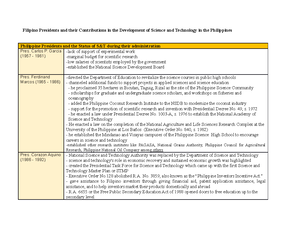- Information
- AI Chat
Was this document helpful?
Intellectual revolutions that shaped society across time
Course: Science, Technology and Society (GEC103)
210 Documents
Students shared 210 documents in this course
University: Cagayan State University
Was this document helpful?

Module 1
Lesson 4
Learning Outcomes:
At the end of lesson, the learner is able to:
1. identify the intellectual revolutions that shaped society across time,
2. explain how intellectual revolutions transformed the views of a society
Discussion:
Intellectual revolutions refer to the series of events that led to the emergence of modern science and
the progress of scientific thinking across critical periods in history.
There are three most important ones that altered the way humans view science and its impact to
society.
1. Copernican Revolution
- The Copernican revolution refers to the 16th century paradigm shift, Nicolaus Copernicus formulated
the heliocentric model of the universe. He repositioned the earth from the center of the solar system
and introduced the idea that the earth rotates on its axis. The model illustrated the earth with other
heavenly bodies to be rotating around the sun.
However, the Copernican model had also inadequacies. But it was soon accepted by a profound scientist,
Galileo Galilei.
2. Darwinian Revolution
- Charles Darwin is credited for stirring another important intellectual revolution in the mid 19 th
century.
The Darwinian revolution was guided by confidence in human reason’s ability to explain phenomenon
in the universe. Darwin presented the natural selection, an evolutionary process which organisms
including humans, inherit, develop and adapt traits that favoured survival and reproduction. Thus, the
Darwinian revolution develops the origin of the unique forms of life and humanity.
Students also viewed
- Gene Therapy (stem cell): basic cells that are able to develop into any type of cell in the body
- Climate Change: Its Causes and Effects And causes of global warming Including the effects of Climate Change
- Famous Inventions of Filipinos and the relevance of their invention to society
- Earth Science WEEK 4 - Lecture notes 1
- (2)Contribution of Technology to Science
- Operations Management and Total Quality ManagementTopic 6











